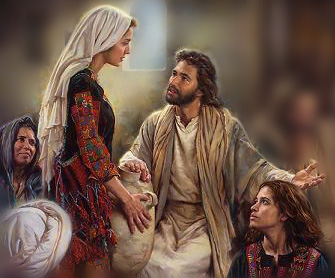This past summer the Word of Life Community in Ann Arbor, Michigan, USA, took several prayer meetings to explore the topic of abandonment to God. In reflecting on the topic several thoughts came to mind. What I am about to share is not something I take lightly. It is a result hard won from daily experience and personal struggles. This area is something with which I still struggle from time to time. It is also a place of immense grace for me because it is an area where I must rely on the Lord.One of my favorite verses in the Bible is Romans 11:29. It says, ďFor the Gift and the Call of God are irrevocable.Ē Godís gift and his call are somehow connected. There is no having the one without the other. What does this have to do with abandonment to God and his will for our lives?
I have, as all of us have, the desire to know Godís call and plan for my life. And usually, if I seek Godís will with a sincere heart it can be found and understood. But not always. Even if I've truly done all I can to understand Godís call through prayer, reflection, and seeking spiritual guidance, I will not always get a clear answer or be aware of his action, at least not right away.
I think God allows this uncertainty, this struggle with Ďnot-knowingí to exist for a reason. If I am always sure of what I think is Godís plan for my life and aware of what the future holds, I would become presumptuous and prideful of being in control of my destiny. Not knowing puts me in a place of constantly seeking him, of reliance on him, and prevents the sort of false security that would negate the need for me to abandon myself to him.
Some of the most difficult things to trust God with, to give over completely to him, are the areas of his will which are the most unclear or uncertain. When I was 21, I discerned that God was calling me to be open to marriage. I am 33 now, and Iím not married. I both know and donít know what Godís full plan for this area of my life will be. What the future holds is not clear to me. Having an unfulfilled vocation is at times very painful. To have an unrealized-desire can lead to two responses, either to abandon God for my own preferences or to abandon myself to God. The first type of abandonment is sinful and leads to hopelessness and despair. The second type is holy and leads to peace, contentment, and the fullness of life which Jesus offers to those who trust in him. Jesus says, "Whoever wants to save his life will lose it, but whoever loses his life for my sake will find it. Mt 16:25."
A holy abandonment of my life to God requires me to surrender my claim on my own life, to relinquish my fears and anxieties, to forsake completely my own will in place of Godís will, and to give up control and to yield myself fully to the Lord Jesus. Nowhere in my life do I experience the need to yield to the Lord and to place myself under his care and jurisdiction than in the area of my vocation. Abandonment like this calls for absolute trust.
There are many times when I donít emotionally feel like I can trust God. But I can choose to act as though I trust him. My mom has a saying, "emotions are the caboose [the rear compartment of a train]; they are the last thing to fall in line." I think that trust, much likelove, is a really an objective choice and not just a feeling.When I feel myself tempted to doubt Godís love and power to provide for me, and to startfeeling anxious and despairing, I then begin to ask myself ďwhat should I actuallybe doing right nowand how should I behave in this situation, if I really trusted God?Ē Even if some aspects of Godís plan seem to escape me, there are always others aspects of Godís love and plan for me that I can know for sure. Most of the time this means doing the next "right" thing, keeping the commitments I have already made, following through with my responsibilities, and loving those around me. This choice to trust is not easy. I often take back that which I have abandoned to the Lord.
Recently, I read something written by Pope Benedict XVI reflecting on John the Baptistís time in prison which really resonated with me. Pope Benedict wrote,
The task set before the Baptist as he lay in prison was to become blessed by this unquestioning acceptance of God's obscure will; to reach the point of asking no further for external, visible, unequivocal clarity, but, instead, of discovering God precisely in the darkness of this world and of his own life, and thus becoming profoundly blessed. John even in his prison cell had to respond once again and anew to his own call for metanoia or a change of mentality, in order that he might recognize his God in the night in which all things earthly exist. Only when we act in this manner does another - and doubtless the greatest - saying of the Baptist reveal its full significance: "He must increase, but I must decrease" (John 3:30). We will know God to the extent that we are set free from ourselves.When I find myself in the dark regarding Godís plan for my life, I can end up spending so much time searching inwardly, doubting myself, or getting discouraged. This leads to my neglect of the things that I know are Godís will for me every single day, such as being faithful in prayer, reading his word in Scripture, and giving thanks for Godís mercy and gift of salvation. Most of the time, I try not to worry about a future spouse. My marriage is not mine to worry about. Marriage is a gift that is given. I try to spend my energies learning to recognize where God is leading me today and developing a heart grateful for all of his gifts. Admittedly, this approach to life is not necessarily the path to marriage, and Iím at peace with that outcome as well. It is the path to greater union with Godóand to happiness, for my true and lasting happiness lies only in God. Embracing this approach to life (and to my singleness) also has nothing to do with forgetting or numbing my desire for marriage, nor is it meant to be a distraction, placeholder, or substitute for marriage. It has everything to do with being available to the Lord for whatever he may ask of me today and in the future. Lacking answers about my future and the blessings and gifts which God may have in store for me, I can still prepare to receive them in Godís good time by surrendering my life to God and living fully for him today.
December 2013/January 2014 - Vol. 71
|
. | |
|
publishing address: Park Royal Business Centre, 9-17 Park Royal Road, Suite 108, London NW10 7LQ, United Kingdom email: living.bulwark@yahoo.com |
. |

